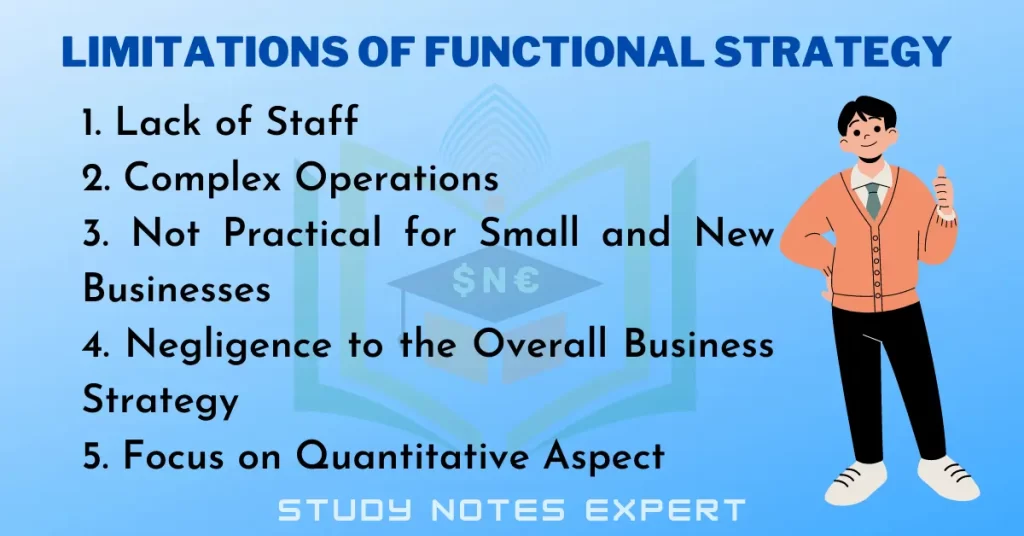The functional strategy refers to how a manager will manage a particular function in a company. If the firm has to achieve its strategic objectives, then all the functional areas must be managed by the company to reach its strategic goals. These functional strategies are developed under the umbrella of the business strategy of the company. The organization thus needs to have a strategy in place for all the functional areas – production, marketing, finance, R&D, etc.
Meaning of Functional Strategy
The individual functional strategies are extensions of the main business strategy. Their purpose is to give more substance and meaning to the designed business strategy. They state how the individual functional area will achieve its strategy and how each area is linked to the overall business strategy. Also, when all the individual functions achieve their distinct objectives, it creates synergy in the organization and in the effective implementation of the business strategy.
The respective heads of the functional areas in the organizations are responsible for the successful formulation and execution of the functional strategy. These strategies are formulated keeping in mind the business strategies of the company. The functional managers translate the functional strategy into performance objectives and ensure the same achievement.
Types of Functional Strategy

Functional strategy can be of the following types:
1. Financial Strategy
The firm’s financial strategy mainly involves gathering and utilizing funds for the business. The major decision to be taken here is the source from which the funds must be raised – equity or debt. If the firm needs to resort to borrowing, then the firm needs to decide the mix – how much should be long-term and how much should be short-tenure borrowing. The deployment of the funds also needs to be considered. Should it be in fixed assets or current assets? Capital investment decisions determine whether the firm should buy or lease the assets.
2. Marketing Strategy
Functional strategies in the marketing domain are formulated for taking decisions regarding the 4 Ps, namely the product, distribution (place), pricing and promotion. It is also referred to as the marketing mix.
3. HR Strategy
HR strategy refers to recruitment, selection, motivation, training, rewards, job analysis, compensation, performance appraisal, etc.
4. Production Strategy
The production strategy refers to areas like capacity utilization, machine run-time and downtime, breakdown and preventive maintenance, the location of the facilities, scheduling of production and materials management.
5. R&D Strategy
In the domain of research and development, the areas pertaining to the issues concerned with research. If the firm plans to launch a new product, it must undertake basic and applied research. On the other hand, if it is seeking to expand in the same product line, the firm has to look for scope improvements in its product /process.
6. Operations Strategy
The operations strategy deals with the method and place of production of a product or a service, the supply chain activities and the logistic activities. It also considers the best possible level of technology to streamline the production process.
7. Purchasing Strategy
Decisions regarding the procurement of raw materials, supplies, spare parts, etc., are the main areas of concern of the purchasing strategy. Here the department head also has to make decisions regarding sole, parallel or multiple purchasing.
8. Logistics Strategy
Logistics deals with the flow of goods and services from the manufacturing process to the customer and back. The three main trends which can be seen in logistics management are outsourcing, centralization, and the growing use of the Internet.
9. Information Systems Strategy
Companies are increasingly fine-tuning their IT strategy to get a competitive advantage over their peers.
Importance of Functional Strategy

The importance of functional level strategy is explained below:
1. Supports Business Strategy
The functional strategy supports the business-level strategy. It helps the strategic business units make decisions regarding different operational areas of a business unit, i.e. production, finance, marketing, human resource, research and development, etc.
2. Allocating Responsibilities
Functional strategies help in successfully allocating resources and assigning tasks to the employees as per their interest levels and expertise. With the help of a functional-level strategy, an employee with excellent convincing skills is allocated to the marketing department rather than the human resource department. The purpose of functional strategy is to see the resources and employees as an end in themselves and not as a tool for achieving the overall organizational goals.
3. Facilitates Integration of Activities
Functional strategies help integrate different departments’ operations, e.g., procurement, shipping of products, coordinating advertising activities, conducting marketing research, allocating funds in functional areas, etc.
4. Outlines Action Plan
As specialists formulate functional strategies, they help outline action plans for achieving departmental objectives, ultimately fulfilling corporate strategy objectives.
5. Provides Information
Functional strategies provide information regarding the capabilities and resources of various functional areas of the organization. This information helps in the formulation of business and corporate-level strategies. The information generated by functional strategies is also significant in achieving coordination among the functional areas for the successful design, production, and delivery of different products and services in the business portfolio.
6. Implementation of Corporate Plans
Functional strategy facilitates the successful implantation of corporate-level plans. It ultimately leads to the overall development and progress of the company.
Limitations of Functional Strategy

Functional strategies for evaluating the distinct value of organizational resources have many benefits. Still, there are some limitations that an organization should study before formulating functional-level strategies:
These limitations are as follows:
1. Lack of Staff
Functional strategies are not practical if there is a staff shortage in various functional areas. Generally, it is observed that business activities related to marketing, finance, HR, etc., are performed by few employees due to a lack of staff and resources. This situation limits the effectiveness of functional strategies.
2. Complex Operations
Sometimes the use of functional strategies complicates business-level operations. Functional strategies sometimes appear clear and simple in theory but may lead to complex situations in practical application.
3. Not Practical for Small and New Businesses
Functional departments are generally not clearly defined in new firms or small business houses. Hence, functional strategies are not suitable for small and new firms.
4. Negligence to the Overall Business Strategy
Functional strategies may also result in negligence of the business strategy. This negligence may arise due to the individual strategic goals of each functional area.
5. Focus on Quantitative Aspect
Functional strategies measure the value of all the resources and assets in numeric terms and tend to neglect the qualitative aspect of the assets.

